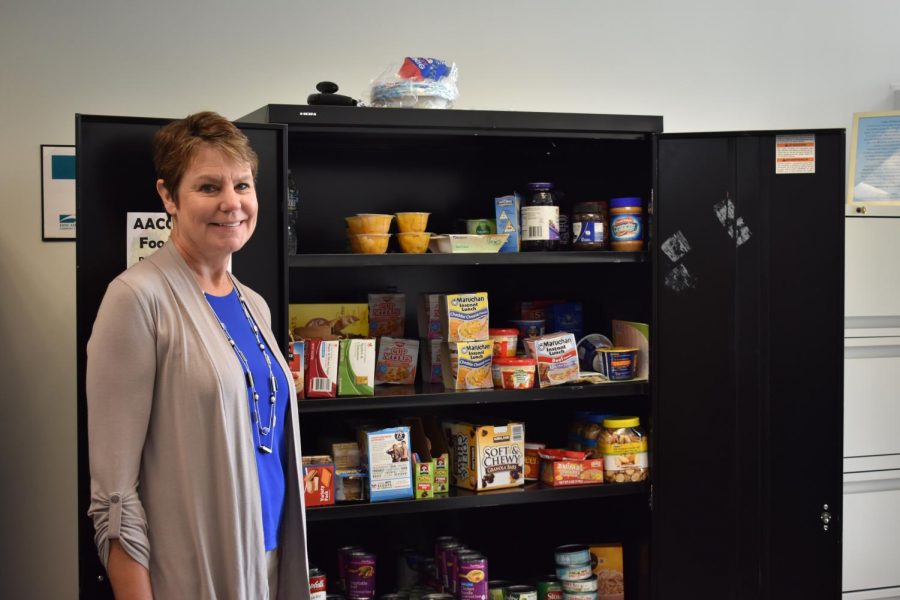Funds, food available at AACC
Director of Student Engagement Chris Storck stands beside the food pantry in her office; the pantry offers food to students who can’t afford meals.
November 1, 2017
AACC offers a free food pantry, emergency funds and other services for students in need of assistance.
The food pantry is a place for students to come if they are hungry and cannot afford food, according to Chris Storck, director of Student Engagement.
“We have lots of students who struggle with financial issues,” Storck said. “You can’t be successful academically if your stomach is growling.”
To use the pantry, students must present their AACC ID cards.
They are allowed to come in once a day and receive up to five items.
The pantry has non-perishable foods like peanut butter, canned goods and dried cereal, as well as toiletries.
Students and faculty can donate food to the pantry at two sites on campus: outside of the Student
Engagement Office in the SUN building; and in the bookstore on the bottom floor of SUN.
“I think it’s cool that we have a food pantry, but I wish there were more donation bins or at least one on West Campus,” Julia White, a second-year nursing student, said. The pantry is located in Storck’s office, SUN 205, and open from 8 a.m. to 4 p.m. Monday through Friday. But according to Dr. Tiffany Boykin, dean of Student Engagement, the pantry will move to SUN 204 in early November to “allow it to grow.”
The hours will remain the same once the pantry moves.
The pantry averages 800 student visits per year and does not seem to have an increase during the holiday season, according to Storck.
Michelle Williams, third-year computer science major, said she used the food pantry a few weeks ago.
“[Students] don’t use it much because they seem to be embarrassed,” she said. “There’s nothing to be embarrassed about, though; if you need help, you need help. The school offers it. Don’t be afraid to take it.”
AACC also offers funds to students who have financial emergencies.
Helplink Grant is an emergency support program for students who find themselves in an unexpected financial crisis.
That might include “whether you find yourself in a situation where you cannot pay for a certain textbook, or you paid all your bills for the month but find yourself not having any gas money to get to school,” Boykin said.
A student may receive up to $300 per academic year. If someone needs more, the grant team will review requests on a case-by-case basis.
According to Boykin, 50 percent of students who use Helplink need the money for transportation, including small repairs to a car or gas to get to school. Thirty percent use it for textbooks and program supplies, and 20 percent use it for medical bills or other expenses.
“We do not give [the student] cash,” Boykin explained. “If they need a gas card [someone from the program] will go get the gas card and give it to them; if they need a certain textbook, then we will get the textbook. We pay directly to wherever the money is needed.”
Boykin said the program is the school’s “best kept secret.”
“I didn’t know the college had that kind of program,” William Deibert, a second-year transfer major, said. “I know some people who dropped out because they couldn’t afford transportation or the cost of books.”
The program receives funds from the Student Government Association, private donors and sometimes through faculty and staff.
Anyone can donate cash, gift cards, gas cards, art supplies or school supplies by visiting SUN 220.
Boykin said students use Helplink more during the first couple of weeks of the semester and right after the holiday season.
AACC established Helplink in 2009. Boykin said she hopes it will continue to grow and more people will take advantage of it and contribute to it.
“[Students] are literally making [their successes] happen by fighting through obstacles to try to be successful in school,” Boykin said. “I feel that [as a school] we have to make it an obligation to make it work for them.”
To apply for assistance, students can contact the Helplink Team by calling 410-777-2511 or going to SUN 220 or AMIL 105 on the Arundel Mills campus. Approval usually takes two or three days, according to Boykin.
Once AACC has approved a student request application, an adviser will meet the applicant for further instructions.
The college also helps homeless students by partnering with county agencies that offer temporary support.
One of the partners is Sarah’s House, a housing program for homeless families in Anne Arundel County.
Some students said AACC is doing well in helping those who are in need.
“The college, in my opinion, is doing well to make sure students in need are taken care of,” Jasmine Hall, a second-year computer science major, said.












